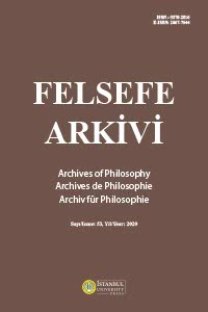Kim’in Dışarlama Argümanına Dair Bir İnceleme
Bu makalede, Jaegwon Kim’in indirgemesiz fizikalizme karşı geliştirmiş olduğu ünlü dışarlama argümanı ve ayrıca bu argümanın yol açtığı iddia edilen dışarlama problemi için yine filozofun kendisinin önerdiği özdeşlik çözümü eleştirel olarak incelemeye tabi tutulacaktır. Söz konusu argümanın indirgemesiz fizikalizm için Kim’in iddia ettiği ölçüde bir sorun teşkil etmediği ve onun kendi çözüm önerisinin ise ikna edici olmadığı savunulacaktır. Çünkü, argümanın dayandırıldığı ilkeler olaylara dair olup, özelliklere dair değildir. Argüman bu yüzden de herhangi bir özelliği dışarlama gücünden yoksun olmaktadır. Özdeşlik çözümüne gelirsek, zihinsel özelliklerle fiziksel özelliklerin özdeşlenmesi anlamsız görünen iki fikri içermektedir. Birincisi, bir kategori hatası içermektedir ki buna göre yapısal özelliklerin aynı zamanda işlevsel özellikler olması gerekmektedir. İkincisi, dönüşlü bir ilişki içermektedir ki buna göre bir özelliği realize eden özelliğin yine kendisi olması gerekmektedir. Bu noktalar detaylandırıldıktan sonra, kısaca dışarlama problemi de ele alınacaktır. Yani, eğer fiziksel özellikler her zaman yeter koşul teşkil ediyorlarsa, bu durumda zihinsel özelliklerin nedensel olarak ilişkin olmaları nasıl mümkündür? Buna cevap aramak için öncelikle Kim’in açıklayıcı dışarlama ilkesi bir özellik dışarlama ilkesine dönüştürülecektir ya da örtük olarak içerdiği ilke açığa çıkarılacaktır. Daha sonra bu ilkeye dayanılarak, zihinsel özelliklerin nedensel olarak ilişkin olmalarının ancak fiziksel özelliklerle belli türden bir bağımlılık ilişkisine girmeleriyle mümkün olduğu bulunacaktır.
Anahtar Kelimeler:
indirgemesiz fizikalizm, dışarlama argümanı, zihinsel özellikler, fiziksel realize olma, dışarlama problemi
Kim's Exclusion Argument Revisited
Critical examination will be made firstly of the exclusion argument, famously developed by Jaegwon Kim, against nonreductive physicalism, and secondly of the identity solution as suggested by Kim himself for the exclusion problem allegedly prompted by his argument. I will argue that the argument is not so much of a trouble for nonreductive physicalism as Kim claims it to be, and that his purported solution is hardly convincing. For one thing, the principles, of which use are made in the argument, concern events, not properties. That is why the argument does not have a direct force to exclude properties. Second, the identification of mental and physical properties involves the idea that a functional property is to be at the same time a structural property, and, on the other hand, it amounts to a reflexive relation such that one and the same property is to realize itself, both of which ideas make little sense. Plus, a brief consideration will be made of the exclusion problem of how it is possible for mental properties to be causally relevant along with physical properties that always suffice for the effect. It will be suggested that mental properties can be causally relevant only if they are dependent upon physical properties, a suggestion which is based on the property-exclusion principle extracted from the principle of explanatory exclusion formulated by Kim himself.
Keywords:
nonreductive physicalism, the exclusion argument, mental properties, physical realization, the exclusion problem,
___
- Armstrong, David. A Materialist Theory of the Mind. New York: Routledge & Kegan Paul, 1969.
- Davidson, Donald. “Reply to Quine on Events.” Actions and Events: Essays on the Philosophy of Donald Davidson. Ed. E. LePore and B. McLaughlin, 172-176. Oxford: Basil Blackwell, 1985.
- Davidson, Donald. “The Individuation of Events,” Essay in Honor of Carl G. Hempel. Ed. Nicholas Rescher, 216-234. Reidel, 1969.
- Dretske, Fred. “Reasons and Causes.” Philosophical Perspectives, 3(1989): 1-15.
- Honderich, Ted. “The Argument for Anomalous Monism.” Analysis, 42(1982): 59-64.
- Kim, Jaegwon, “Events as Exemplifications.” Action Theory. Ed. Myles Brand and Douglas Walton, 159-177. Holland: D. Reidel Publishing Co., 1976.
- Kim, Jaegwon. “Mechanism, Purpose, and Explanatory Exclusion.” Philosophical Perspectives, 3(1989b): 77-108. Reprinted 1995b: 237-264.
- Kim, Jaegwon. "Mind-Body Problem: Taking Stock After Forty Years," Noûs, 31(1997b): 185-207.
- Kim, Jaegwon. “Postscripts On Mental Causation.” Supervenience and Mind. Ed. Jaegwon Kim, 358-367. New York: Cambridge University Press, 1995a.
- Kim, Jaegwon. “Psychophysical Supervenience.” Philosophical Studies, 41(1982): 51-70.
- Kim, Jaegwon. “The Myth of Nonreductive Physicalism.” Proceedings and Addresses of the American Philosophical Association, 63(1989a): 31-47. Reprinted 1995b: 265-284
- Kim, Jaegwon. “The Nonreductivist’s Troubles with Mental Causation.” Mental Causation. Ed. Alfred Mele and John Heil, 189-210. New York: Oxford University Press, 1993.
- Reprinted 1995b: 336-357. Kim, Jaegwon. “What is the Problem of Mental Causation.” Structures and Norms in Science. Ed. M. l. Dalla Chiara et al, 319-329.
- Kluwer Academic Publishers, 1997a. Kim, Jaegwon. Physicalism or Something Near Enough. New Jersey: Princeton University Press, 2005.
- Kim, Jaegwon. Supervenience and Mind. New York: Cambridge University Press, 1995b. Lewis, David. “Extrinsic Properties,” Philosophical Studies, 44(1983): 197-200.
- MacDonald, Cynthia ve MacDonald, Graham. “The Metaphysics of Mental Causation.” The Journal of Philosophy, 103(2006): 539-576.
- McLaughlin, Brian. “On Davidson’s Response to the Charge of Epiphenomenalism.” Mental Causation. Ed. Alfred Mele and John Heil, 27-40. New York: Oxford University Press, 1993.
- Quine, W. V. O. “Events and Reification.” Actions and Events: Essays on the Philosophy of Donald Davidson. Ed. E. LePore and B. McLaughlin, 162-171. Oxford: Basil Blackwell, 1985.
- Searle, John. “Determinables and the Notion of Resemblance.” The Aristotelian Society, Supplement, 33(1959): 141-158.
- Sosa, Ernest. “Mind-Body Interaction and Supervenient Causation.” Midwest Studies in Philosophy, 9(1984): 276-281.
- Yablo, Stephen. “Mental Causation.” The Philosophical Review, 101(1992): 245-280.
- ISSN: 0378-2816
- Başlangıç: 1945
- Yayıncı: İstanbul Üniversitesi
